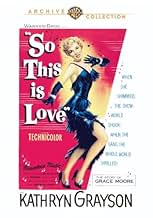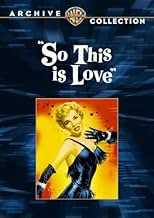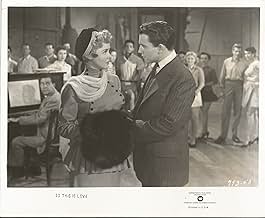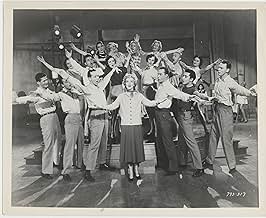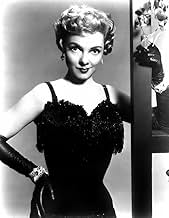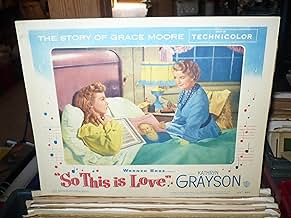AVALIAÇÃO DA IMDb
6,0/10
282
SUA AVALIAÇÃO
Adicionar um enredo no seu idiomaBiopic of opera star Grace Moore, who was killed in a plane crash in 1947.Biopic of opera star Grace Moore, who was killed in a plane crash in 1947.Biopic of opera star Grace Moore, who was killed in a plane crash in 1947.
John Alban
- Opera Spectator
- (não creditado)
Bill Alcorn
- Backstage Performer
- (não creditado)
Jerry Antes
- Chorus Boy
- (não creditado)
William Bakewell
- Charles, Waiter
- (não creditado)
Avaliações em destaque
Before I began watching "So This is Love", I read through the IMDB reviews. One struck me when it essentially said that the way they portrayed Grace Moore made her difficult to like. Well, I did some reading and after realizing much of the film is rather fictional (no surprise given when it was made), Ms. Moore as played by Kathryn Grayson is actually reasonably close to the real thing when it comes to behaving like a diva. She was, apparently, rather difficult to like and was abrasive and was known for her foul language. So, at least in this sense, I think the movie actually makes Moore seem pretty good.
So am I saying it's a good biopic about the opera star, Grace Moore? Not especially. I saw two big problems. First, the film only goes up to Moore's successful performance at the Met in the early 1920s. She didn't die until well over two decades later and we learn nothing about this part of her life . Second, the film sure seemed like a showcase for Grayson than a biopic. It was chocked full of musical numbers and a few dance numbers...when instead the film should have concentrated more on letting us know who Moore was.
Overall, this is a slick looking film chock full of Grayson production numbers. On this level, it works if you like that sort of thing. But its shallow treatment of Moore makes you wish a really good biopic could be made about her and her up and down career.
So am I saying it's a good biopic about the opera star, Grace Moore? Not especially. I saw two big problems. First, the film only goes up to Moore's successful performance at the Met in the early 1920s. She didn't die until well over two decades later and we learn nothing about this part of her life . Second, the film sure seemed like a showcase for Grayson than a biopic. It was chocked full of musical numbers and a few dance numbers...when instead the film should have concentrated more on letting us know who Moore was.
Overall, this is a slick looking film chock full of Grayson production numbers. On this level, it works if you like that sort of thing. But its shallow treatment of Moore makes you wish a really good biopic could be made about her and her up and down career.
If Grace Moore were still alive I'm sure she'd have been pleased that she was tributed by another great soprano in the person of Kathryn Grayson. But she'd probably wonder where are all the songs that she made famous.
Probably because the two American studios that she worked for, first MGM and then Columbia held all the copyrights and Jack Warner wasn't about to shell out some big bucks for One Night Of Love, Love Me Forever and I'll Take Romance for his film. It makes me wonder why his studio chose Grace Moore as the subject of a biographical film.
The problem was somewhat solved by taking her story up to 1928, the year she made her Metropolitan Opera debut. All these songs were in the future. But they also managed to select a list of popular songs that she wasn't identified with at all. I did a bit of research on the subject and confirmed it. The only song that Grayson sings in So This Is Love that is both not operatic and identified with Grace Moore is Ciribiribin, cheerfully for Jack Warner in the public domain.
The story we get as far as it goes is that of young Grace Moore, born in Slabtown, raised in Jellico, Tennessee who had a burning ambition to sing. Nothing stood in her way and we see a few broken hearts like Merv Griffin's and Douglas Dick's left by the wayside. What's not shown here is that Grace Moore was every inch southern born and bred and that includes a few negatives I think you can figure out.
What Grace Moore was however was one of the greatest entertainers of the 20th century. She conquered five mediums, the musical stage, grand opera, recordings, radio, and film. The last three get no mention at all. She was the most popular selling classical artist between Enrico Caruso and Mario Lanza on record, she was a Hollywood star as I said before later in her career, and she appeared numerous times on radio on the Bell Telephone Hour. Not touching on any of that in So This Is Love does Moore an injustice.
Her life story would make a compelling film if the real story were told and maybe Columbia could do it and dub her voice to a current actress. There are surely none around like Kathryn Grayson who could actually sing those songs.
Probably because the two American studios that she worked for, first MGM and then Columbia held all the copyrights and Jack Warner wasn't about to shell out some big bucks for One Night Of Love, Love Me Forever and I'll Take Romance for his film. It makes me wonder why his studio chose Grace Moore as the subject of a biographical film.
The problem was somewhat solved by taking her story up to 1928, the year she made her Metropolitan Opera debut. All these songs were in the future. But they also managed to select a list of popular songs that she wasn't identified with at all. I did a bit of research on the subject and confirmed it. The only song that Grayson sings in So This Is Love that is both not operatic and identified with Grace Moore is Ciribiribin, cheerfully for Jack Warner in the public domain.
The story we get as far as it goes is that of young Grace Moore, born in Slabtown, raised in Jellico, Tennessee who had a burning ambition to sing. Nothing stood in her way and we see a few broken hearts like Merv Griffin's and Douglas Dick's left by the wayside. What's not shown here is that Grace Moore was every inch southern born and bred and that includes a few negatives I think you can figure out.
What Grace Moore was however was one of the greatest entertainers of the 20th century. She conquered five mediums, the musical stage, grand opera, recordings, radio, and film. The last three get no mention at all. She was the most popular selling classical artist between Enrico Caruso and Mario Lanza on record, she was a Hollywood star as I said before later in her career, and she appeared numerous times on radio on the Bell Telephone Hour. Not touching on any of that in So This Is Love does Moore an injustice.
Her life story would make a compelling film if the real story were told and maybe Columbia could do it and dub her voice to a current actress. There are surely none around like Kathryn Grayson who could actually sing those songs.
Before watching this biopic starring Kathryn Grayson, I'd never heard of the opera star Grace Moore. If you've never heard of her either, do an online search and learn about a woman who contributed her talents to films, Broadway, and opera. She was beautiful and had a beautiful voice, so it's no wonder Hollywood chose Kathryn Grayson to portray her!
The main problem with the film is, unfortunately, how John Monks Jr. wrote Grace's character. From her childhood through the end of the movie, she's portrayed as a snotty brat! As she pushes and pouts her way to the top, I found myself only halfway rooting for her. Kathryn is a very likable actress, so that helped me get through it. Still, Grace Moore wasn't painted out in a very favorable light. She's written to be selfish, arrogant, too big for her britches, disrespectful, and unwilling to pay her dues. I wonder why the script wasn't changed-or perhaps it had been, and Miss Moore was even more unlikable in real life!
Still, Kathryn gets to show off her beautiful voice and her distracting figure. She's joined by Walter Abel, Rosemary DeCamp, Merv Griffin, Joan Weldon, and Douglas Dick, but besides Walter-who plays her frustrated father-no one else is really given anything to do. As biopics go, this one's really only watchable because Kathryn Grayson is so cute and has such a beautiful voice. If you're looking for one that stands on its own merit, watch Love Me or Leave Me.
The main problem with the film is, unfortunately, how John Monks Jr. wrote Grace's character. From her childhood through the end of the movie, she's portrayed as a snotty brat! As she pushes and pouts her way to the top, I found myself only halfway rooting for her. Kathryn is a very likable actress, so that helped me get through it. Still, Grace Moore wasn't painted out in a very favorable light. She's written to be selfish, arrogant, too big for her britches, disrespectful, and unwilling to pay her dues. I wonder why the script wasn't changed-or perhaps it had been, and Miss Moore was even more unlikable in real life!
Still, Kathryn gets to show off her beautiful voice and her distracting figure. She's joined by Walter Abel, Rosemary DeCamp, Merv Griffin, Joan Weldon, and Douglas Dick, but besides Walter-who plays her frustrated father-no one else is really given anything to do. As biopics go, this one's really only watchable because Kathryn Grayson is so cute and has such a beautiful voice. If you're looking for one that stands on its own merit, watch Love Me or Leave Me.
I saw this film many years ago and would love to see it again. I also wish it were available in DVD. It is the true story of Grace Moore, who was born in Tennessee in 1898. She was a singer of Broadway musicals, an opera star, and a lovely lady Florenz Ziegfeld described as "the most beautiful woman in the world." Tragically, Miss Moore was killed in a plane crash in Copenhagen, Denmark, in January 1947. Also on board was a member of the Danish royal family. In the nearly six decades after her death, Miss Moore's talent lives on in the recordings of her music.
I hope this film will be appreciated by today's young people and that they will learn valuable lessons from it.
I hope this film will be appreciated by today's young people and that they will learn valuable lessons from it.
SO THIS IS LOVE is said to be based on a biography of singer Grace Moore, but it only touches on her early life and determination to become an opera singer, up until her New York City debut at the Metropolitan Opera House in "La Boheme." Before it reaches that point, it gives KATHRYN GRAYSON a chance to sing a variety of songs in coloratura style, but since the story does not cover Miss Moore's Hollywood career at all, many of her most well-known songs had to be omitted. Instead, we get a sprinkling of a few opera numbers and many other pop standards, all of them suitable for Grayson's voice. She's in fine form vocally and delivers all of the songs with her customary charm and grace.
MERV GRIFFIN, before his celebrity and TV fame, makes his second appearance in a movie as one of Miss Moore's admirers and gets to warble "I Kiss Your Hand Madame" while doing a nice job on the vocals. WALTER ABEL and ANN DORAN play Grayson's parents, not at all thrilled that she wants to leave her small town life for a fling at stardom in the big city.
Grayson has a role that is tailor-made for her own background as a singer. DOUGLAS DICK is rather colorless as another disappointed suitor who can't compete with her operatic ambitions, but FORTUNIO BONANOVA is excellent as a sympathetic voice coach who makes sure that she takes proper care of her throat condition before returning to him for his coaching.
The story simply ends with her first appearance at the Met as Mimi in "La Boheme." Opera fans should enjoy this tribute to Miss Moore, and fans of Miss Grayson should appreciate the care taken to photograph her in beautiful close-ups while she takes aim at arias by Gounod and Puccini.
MERV GRIFFIN, before his celebrity and TV fame, makes his second appearance in a movie as one of Miss Moore's admirers and gets to warble "I Kiss Your Hand Madame" while doing a nice job on the vocals. WALTER ABEL and ANN DORAN play Grayson's parents, not at all thrilled that she wants to leave her small town life for a fling at stardom in the big city.
Grayson has a role that is tailor-made for her own background as a singer. DOUGLAS DICK is rather colorless as another disappointed suitor who can't compete with her operatic ambitions, but FORTUNIO BONANOVA is excellent as a sympathetic voice coach who makes sure that she takes proper care of her throat condition before returning to him for his coaching.
The story simply ends with her first appearance at the Met as Mimi in "La Boheme." Opera fans should enjoy this tribute to Miss Moore, and fans of Miss Grayson should appreciate the care taken to photograph her in beautiful close-ups while she takes aim at arias by Gounod and Puccini.
Você sabia?
- CuriosidadesKathryn Grant's film debut.
- Erros de gravaçãoGrace's hometown is misspelled "Jellicoe" instead of "Jellico." While this mistake has been made over many decades by many others, you'd think someone in a biopic production would at least make a phone call or check a map to get it right.
Principais escolhas
Faça login para avaliar e ver a lista de recomendações personalizadas
Detalhes
- Data de lançamento
- País de origem
- Idioma
- Também conhecido como
- A História de Grace Moore
- Locações de filme
- Empresa de produção
- Consulte mais créditos da empresa na IMDbPro
- Tempo de duração1 hora 41 minutos
- Proporção
- 1.37 : 1
Contribua para esta página
Sugerir uma alteração ou adicionar conteúdo ausente

